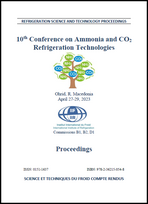
Résumé
The global trend towards using natural refrigerants has been intensifying recently. R717 (ammonia) is a kind of natural refrigerant with zero ODP, zero GWP, and significantly high energy efficiency. However, the toxicity and corrosivity restrict its domestic and small-scale use. The oil lubricant can also be a problem. This paper presents a heat pump model adopting a novel oil-free linear compressor that keeps coil windings outside the pressure vessel, making it possible for ammonia. The heat pump model was built and validated by experiments using R134a. R717 was used as the refrigerant to predict the performance of the linear compressor heat pump using the validated model. The model shows that the mass flow rate, power input and input current increase linearly as the stroke increases at condenser temperature of 50℃ and evaporator temperature of 10℃. When the condenser temperature is fixed at 50℃, the CoP and heating capacity, and mass flow increases with evaporator temperature linearly. The normalised CoP is about 0.35. The predictive results for R717 will be validated in future experiments.
Documents disponibles
Format PDF
Pages : 7
Disponible
Prix public
20 €
Prix membre*
Gratuit
* meilleur tarif applicable selon le type d'adhésion (voir le détail des avantages des adhésions individuelles et collectives)
Détails
- Titre original : Modelling of a novel oil-free linear compressor for small ammonia heat pump.
- Identifiant de la fiche : 30030990
- Langues : Anglais
- Sujet : Technologie
- Source : 10th IIR Conference on Ammonia and CO2 Refrigeration Technologies.
- Date d'édition : 27/04/2023
- DOI : http://dx.doi.org/10.18462/iir.nh3-co2.2023.0031
Liens
Voir d'autres communications du même compte rendu (38)
Voir le compte rendu de la conférence
Indexation
-
Thèmes :
Ammoniac;
Techniques des pompes à chaleur;
Compresseurs - Mots-clés : Compresseur sec; Compresseur linéaire; R717; Ammoniac; Pompe à chaleur; Modélisation; COP; Chauffage
-
Mapping of coefficient of performance for large...
- Auteurs : JØRGENSEN P., OMMEN T., MARKUSSEN M., et al.
- Date : 24/08/2019
- Langues : Anglais
- Source : Proceedings of the 25th IIR International Congress of Refrigeration: Montréal , Canada, August 24-30, 2019.
- Formats : PDF
Voir la fiche
-
Design of oil-free turbocompressors for a two-s...
- Auteurs : JAVED A., ARPAGAUS C., BERTSCH S., et al.
- Date : 11/07/2016
- Langues : Anglais
- Source : 2016 Purdue Conferences. 23rd International Compressor Engineering Conference at Purdue.
- Formats : PDF
Voir la fiche
-
Community heat pump systems utilizing oil-free ...
- Auteurs : TURNER D., ZIVIANI D.
- Date : 24/05/2021
- Langues : Anglais
- Source : 2021 Purdue Conferences. 6th International High Performance Buildings Conference at Purdue.
- Formats : PDF
Voir la fiche
-
High-speed low power radial turbo compressor fo...
- Auteurs : SCHIFFMANN J., FAVRAT D.
- Date : 17/07/2006
- Langues : Anglais
- Source : 2006 Purdue Conferences. 18th International Compressor Engineering Conference at Purdue & 11th International Refrigeration and Air-Conditioning Conference at Purdue [CD-ROM].
- Formats : PDF
Voir la fiche
-
Generalized COP estimation of heat pump process...
- Auteurs : OMMEN T., JENSEN J., MEESENBURG W., et al.
- Date : 24/08/2019
- Langues : Anglais
- Source : Proceedings of the 25th IIR International Congress of Refrigeration: Montréal , Canada, August 24-30, 2019.
- Formats : PDF
Voir la fiche
